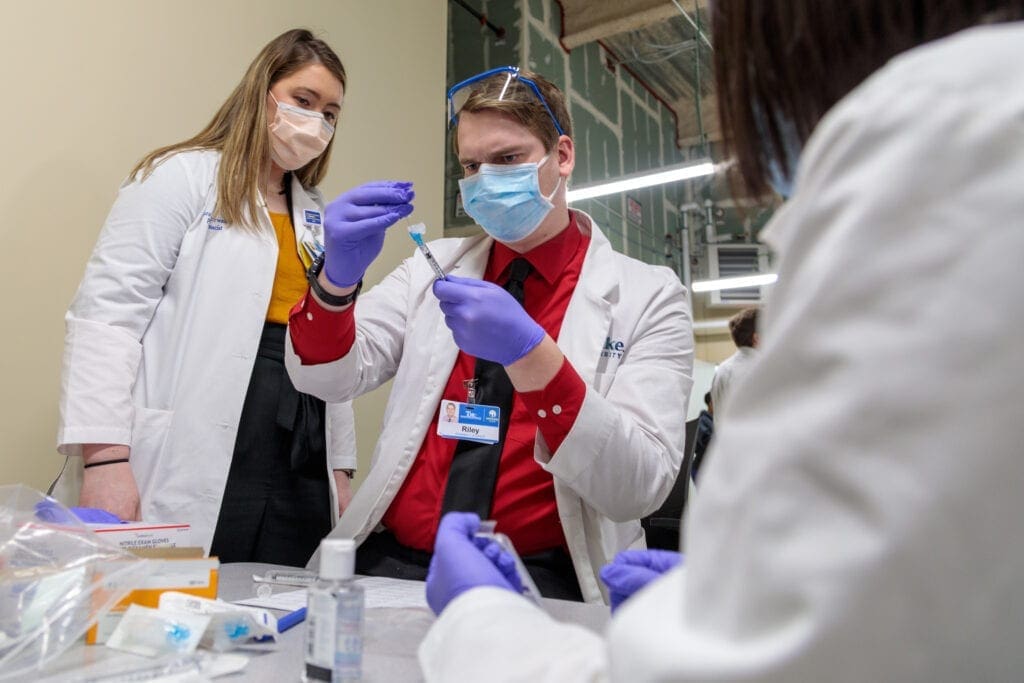7 Things to Know About the COVID-19 Vaccine

We know you’ve got questions about the COVID-19 vaccine, and that’s a good thing (yes, really). It’s important to be well-informed before making a decision about your health, which is why we’re providing seven things you should know about the COVID-19 vaccine.
1. It’s been tested (a lot).
The U.S. FDA has a robust and rigorous system in place to ensure the safety and efficacy of vaccines introduced to the general population.
Before COVID-19 vaccines are approved, they go through a series of tests, or trials, to determine whether they’ll be safe for public consumption. More than 43,000 volunteers participated in the Pfizer trial and 30,000 volunteers participated in the Moderna trial. Both vaccines were well-tolerated among participants. The efficacy of the vaccine was consistent across age, gender, race, ethnicity, body mass index, and presence of underlying conditions.
The information from these trials allows the FDA to evaluate the safety and efficacy of the vaccines. FDA has determined that the newly authorized COVID-19 vaccines meet its safety and efficacy standards and has made these vaccines available for use in the United States under an Emergency Use Authorization.
2. It’s gone through the same process as other vaccines.
COVID-19 vaccines approved by the FDA have undergone the same level of review and have met the same effectiveness expectations as other life-saving vaccines — such as Smallpox, Polio, Measles, Mumps, Rubella, Hepatitis, and more.
No shortcuts have been taken in the development of the COVID-19 vaccines. All COVID-19 vaccines approved by the FDA have gone through the same process as all other vaccines on the market.
3. Scientists have used innovation and technology to move the process along.
So how did the COVID-19 vaccine get developed so quickly while other vaccines have taken years? Well, scientists working on the COVID-19 vaccines have leveraged the vaccine development processes already in place from the H1N1 and Ebola vaccines. Basically, they’re always learning and improving, and thankfully that helps speed up the development process!
4. Side effects are pretty much what you’d expect from a flu shot.
However, side effects from the COVID-19 vaccine are a bit more noticeable than the flu vaccine. Roughly 1 in 10 people may experience tenderness at the site of injection, headache, aches and pains, a low-grade fever, and fatigue. It’s important to note that there isn’t a drug 100% free from side effects.
Oftentimes people think the vaccine has made them sick, but that’s not the case. You cannot get COVID-19 from the vaccine, but you may feel side effects. Some side effects are to be expected with vaccinations. This means your immune system is working the way we want it to by building up a response so your body is ready to fight if you’re exposed to the virus.
5. Getting the vaccine is much safer for you than getting the disease itself.
As mentioned, you may experience some side effects after receiving the COVID-19 vaccine, much like you would after getting a flu shot. These side effects do not mean you are sick and should go away in a few days. Compared with the alternative of being sick with COVID-19 for much longer, the pros of the vaccine’s protection outweigh the potential side effects.
6. The vaccines are proven to be effective in preventing COVID-19 and reducing the severity of infection.
Data from the Pfizer clinical trial indicates 95% efficacy against COVID-19. Moderna reports a 94.5% efficacy against COVID-19 and a 100% efficacy against severe COVID-19 infection.
7. Experts will continue to monitor any issues that may arise with the vaccine.
This continued monitoring will detect side effects that may not have been seen in clinical trials. If an unexpected side effect with the new COVID-19 vaccines is seen, experts can quickly study it further to determine if it is truly a safety concern. Monitoring vaccine safety is critical to help ensure that the benefits of the COVID-19 vaccines continue to outweigh the risks for people who are vaccinated.
Find answers to more of your questions about the COVID-19 vaccine on our FAQ page.
Sources
Archives
- February 2026 (1)
- December 2025 (1)
- November 2025 (2)
- September 2025 (1)
- July 2025 (2)
- June 2025 (3)
- April 2025 (2)
- January 2025 (2)
- December 2024 (1)
- September 2024 (2)
- August 2024 (2)
- July 2024 (1)
- June 2024 (1)
- February 2024 (1)
- July 2023 (1)
- March 2023 (1)
- October 2022 (1)
- September 2022 (1)
- August 2022 (1)
- July 2022 (2)
- June 2022 (2)
- May 2022 (1)
- April 2022 (4)
- March 2022 (1)
- February 2022 (1)
- January 2022 (1)
- December 2021 (4)
- November 2021 (3)
- September 2021 (2)
- August 2021 (3)
- July 2021 (2)
- June 2021 (1)
- May 2021 (2)
- March 2021 (1)
- December 2020 (6)
- November 2020 (8)
- October 2020 (4)
- September 2020 (7)
- August 2020 (3)
- July 2020 (11)
- May 2020 (2)
- April 2020 (4)
- March 2020 (1)
Categories
- Communicable Disease (5)
- Clinical Services (19)
- Clinical Servcies (1)
- Health Promotions (74)
- Emergency Preparedness (8)





